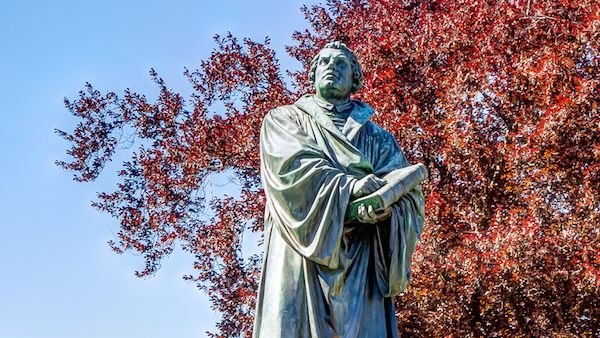Can you imagine wishing someone “Happy Reformation Day!” on October 31? That other holiday– the one with pumpkins, trick-or-treating, witches and candy–seems to take pride of place.
And yet, if I had to choose one of the two holidays for its life-changing importance, its transforming effect on how people worship, pray and look at Scripture, well, Reformation Day wins hands down.
Maybe I should dress up as Martin Luther this year, wear a monk’s habit, and sing one of his landmark hymns, like “A Mighty Fortress Is Our God.” Exactly 499 years ago on October 31, he changed the world.
If the two holidays have anything in common I would propose it’s ghosts–or at least something frightening–and a door, although not quite like the door your average trick-or-treater knocks on.
First the fright. The young Martin Luther, son of a prosperous German businessman, had attended university and was just beginning his study of the law in 1505, when he was caught on horseback in a terrifying thunderstorm, a bolt of lightning barely missing him.
Luther prayed that if he was delivered from the storm, he would become a monk. He survived and true to his word, within two weeks he entered a monastery.
Now for the door. By this time, in 1517, Martin Luther was not only a monk but a learned scholar in Wittenberg, a professor with considerable command of the Bible and theology. What bothered him at the time was the selling of indulgences by the Church.
Selling indulgences was a relatively new practice of raising money by promising salvation. As the monk sent to Germany claimed in a rather aggressive marketing campaign, “As soon as the coin in the coffer rings, the soul from purgatory springs.”
Martin Luther objected. Strenuously. On theological grounds and also on political grounds. Why should good Germans give their money to help the pope rebuild St. Peter’s in Rome?
He wrote up his now famous 95 theses, or rather his objections, and posted them on the door of All Saints Church in Wittenberg.
It all might have ended there. A religious squabble in a backwater town. But those objections of his, eloquently put, spread like wildfire across Germany and the rest of Europe.
Read More: Prayer Partners, Best Friends
Martin Luther ended up leaving the monastery, defending his beliefs, getting married, translating the Bible out of Latin and into the vernacular so that people could read it. Without totally intending it, he started a new branch of Christianity.
It all started on October 31.
A lot of negative things could be said about him–his anti-Semitic writings would be used and misused in horrible and tragic ways. But no doubt about it, he was a brilliant man who changed the world…I might not be reading Scripture in my own language were it not for him. I certainly wouldn’t be singing magnificent hymns like “A Mighty Fortress Is Our God.”
Halloween or Reformation Day? Maybe we’ll find a way to celebrate the two together. In the meanwhile, I’ll be singing those words about that “bulwark never failing, our helper he amid the flood…”
Happy Reformation Day.
PS: Some scholars argue that the 95 theses were never posted on the church door. No matter. There is no doubt about their author or their effect.






